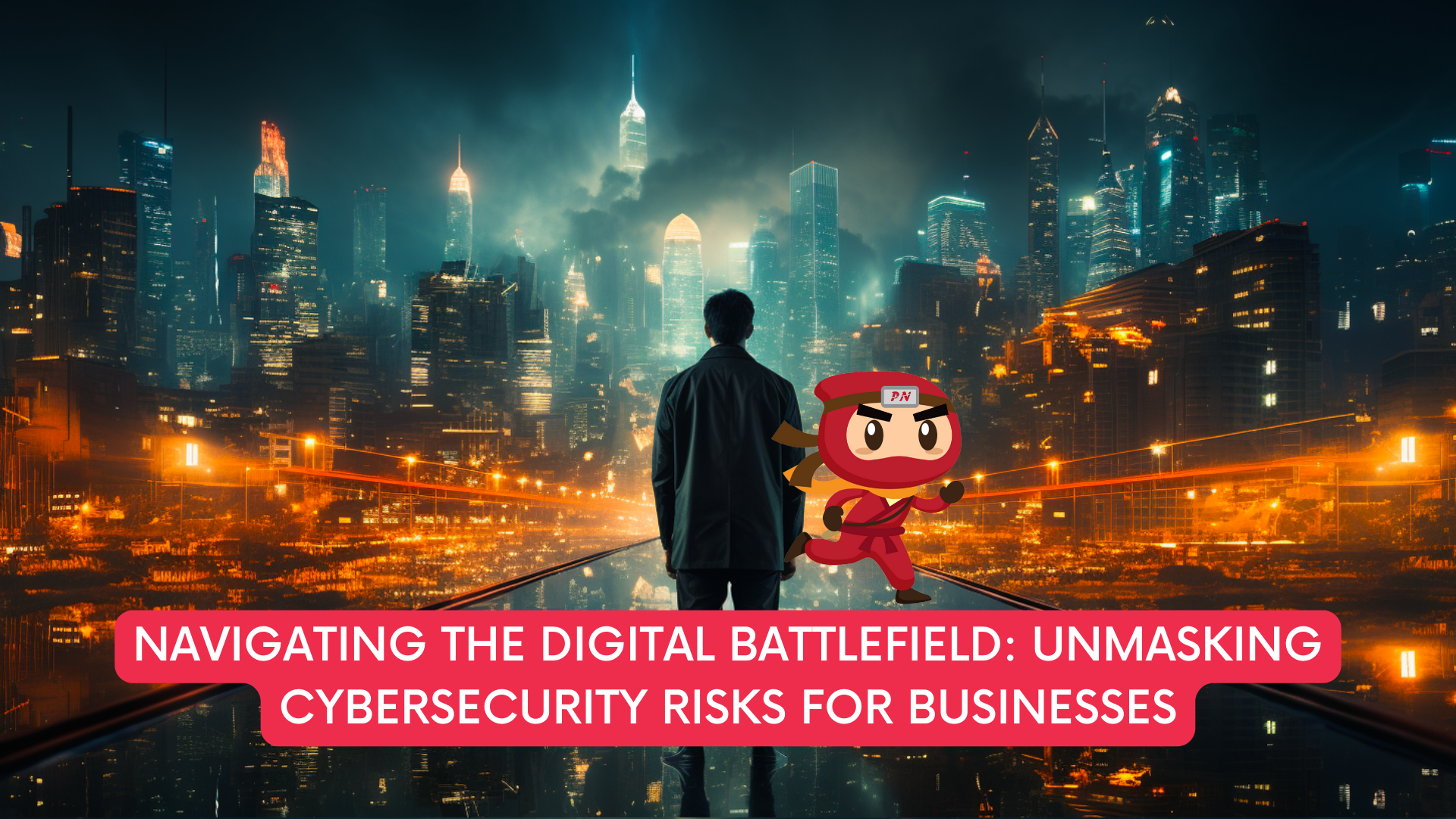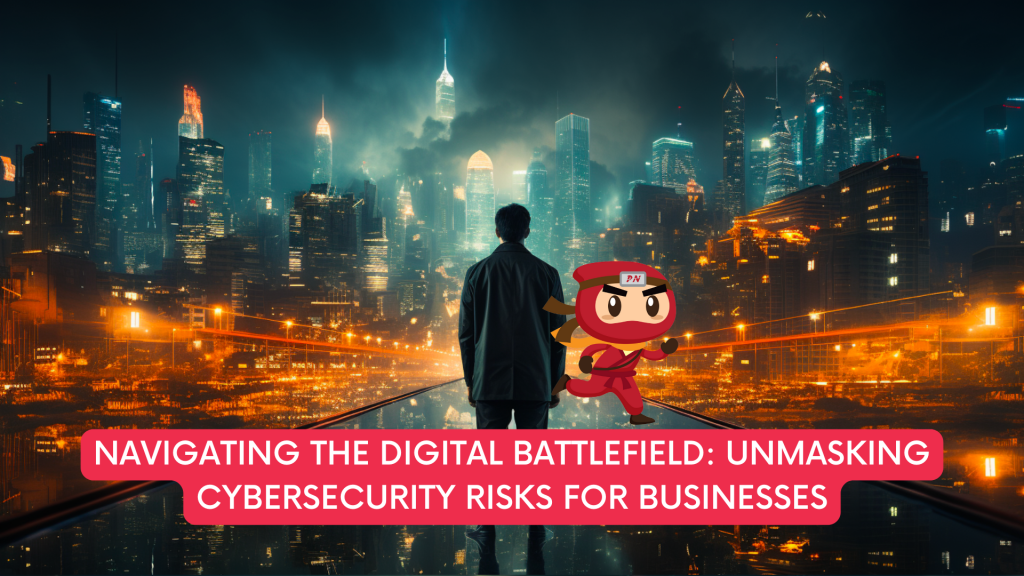KEEP IN TOUCH
Subscribe to our mailing list to get free tips on Data Protection and Cybersecurity updates weekly!







Businesses are increasingly relying on technology to streamline their operations, innovate, and connect with customers. However, this digital transformation comes with an inherent risk – cyber threats.
Cybersecurity has emerged as a critical aspect of business operations, as companies face a relentless onslaught of cyber-attacks that target their valuable data, finances, and reputation. This article delves into the complex world of cybersecurity, exploring the various risks businesses must navigate to protect their assets and maintain a resilient digital presence.
The digital battlefield has become more treacherous, with cybercriminals continuously honing their skills and evolving their attack strategies. From malicious ransomware to stealthy phishing campaigns, businesses face an array of threats that can cripple their operations and lead to significant financial losses. The ever-expanding threat landscape demands that businesses adopt proactive cybersecurity measures to stay ahead of the adversaries.
Data breaches remain a pressing concern for businesses, as cyber attackers relentlessly target sensitive information, such as customer data, intellectual property, and financial records. A single breach can have devastating consequences, not only in terms of financial losses but also damage to the company’s reputation and customer trust. Protecting data through robust encryption, access controls, and data breach response plans is paramount to safeguarding business continuity.
It’s not just external attackers that businesses must worry about; insider threats also pose significant risks. Employees with access to critical systems and sensitive data can inadvertently or maliciously cause security breaches. Businesses need to implement stringent access controls, conduct regular security awareness training, and establish a culture of security to mitigate insider threat risks effectively.
Phishing attacks remain one of the most prevalent and effective cyber threats. Cybercriminals use social engineering techniques to deceive employees into divulging sensitive information or clicking on malicious links. Education and training are crucial in building a resilient line of defense against phishing attacks, as human error remains a significant factor in successful breaches.

Ransomware attacks have become increasingly sophisticated, with cybercriminals employing advanced encryption algorithms to hold businesses’ data hostage. Paying the ransom is not a guarantee of data recovery, and it may even encourage more attacks. Regular data backups, robust cybersecurity tools, and incident response planning are vital in combating ransomware threats.
Businesses often collaborate with multiple vendors and third-party partners, which can introduce additional cybersecurity risks. Cybercriminals may target these third parties as an entry point to gain unauthorized access to a company’s network. Proper vetting of vendors, contractually binding them to security requirements, and continuous monitoring of third-party security practices are crucial steps in mitigating supply chain risks.
Distributed Denial of Service (DDoS) attacks can overwhelm a business’s online infrastructure, causing service disruptions and significant revenue losses. Investing in DDoS mitigation solutions, resilient hosting platforms, and traffic analysis tools can help businesses thwart such attacks and maintain an uninterrupted online presence.
As businesses deploy a wide range of software and applications, maintaining strong cybersecurity requires diligent patch management. Cyber attackers often exploit known vulnerabilities in outdated software to gain unauthorized access. Regularly updating and patching systems is a critical practice to minimize vulnerabilities and strengthen overall cybersecurity posture.
With the proliferation of IoT devices, businesses are exposed to new security challenges. Many IoT devices lack robust security measures, making them vulnerable to exploitation. Implementing strong security protocols and regular monitoring of IoT devices can prevent potential cyber intrusions.
Failing to meet cybersecurity compliance standards can lead to severe legal and financial consequences for businesses. Organizations must navigate a complex web of data protection and privacy regulations to avoid hefty fines and damage to their reputation. Proactive cybersecurity measures, regular audits, and appointing DPOs help ensure compliance with relevant laws.

In the ever-evolving digital landscape, businesses face a formidable array of cybersecurity risks that threaten their assets, reputation, and bottom line. Embracing a comprehensive cybersecurity strategy, from educating employees about best practices to investing in robust technologies, is essential in safeguarding against cyber threats.
A proactive approach to cybersecurity enables businesses to stay resilient, maintain customer trust, and navigate the digital battlefield with confidence. By understanding and addressing these cybersecurity risks head-on, businesses can fortify their digital defenses and thrive in an increasingly connected world.
A Data Protection Officer (DPO) oversees data protection responsibilities and ensures that organisations comply with the Personal Data Protection Act (PDPA). Furthermore, every Organization’s DPO should be able to curb any instances of PDPA noncompliance as it is the officer responsible for maintaining the positive posture of an organisation’s cybersecurity.
DPOs complement organisations’ efforts to ensure that the organisation’s methods of collecting personal data comply with the PDPA. It also ensures that policies are set in place to make sure that there will be no instances of data breaches in the future.
Don’t wait any longer to ensure your organisation is PDPA compliant. Take our free 3-minute PDPA Compliance Self-audit checklist now, the same “secret weapon” used by our clients to keep them on track. Upon completion, we will send you the results so you can take the necessary action to protect your customers’ data. Complete the free assessment checklist today and take the first step towards protecting your customers’ personal data.